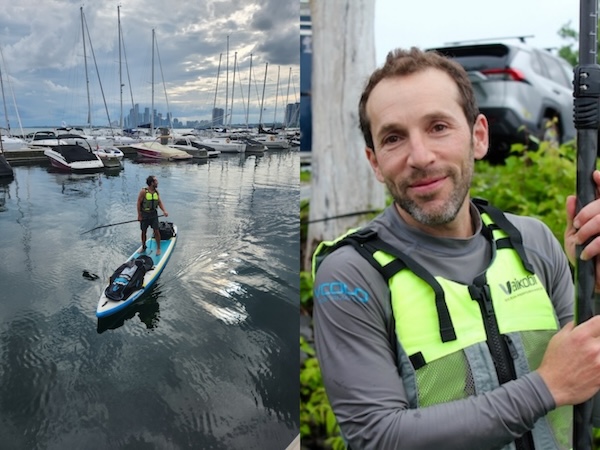Dan Rubinstein is the author of Water Borne: A 1,200-Mile Paddleboarding Pilgrimage, which details his round-trip journey on a 14-foot inflatable standup paddleboard from Canada to New York City via the Erie Canal and the Hudson River.
Why do this?
I’d been writing about and learning about “blue space” and its impact on our mental health, exploring what happens when we spend time around the water, and how it inspires us to take better care of the planet. I figured, why not test the theories on myself? I could talk to people whose lives or work revolve around water and see if there’s a compelling narrative.

You discovered an informal community of “river people.” Were you surprised?
That was the spirit of the trip — people went out of their way to help. I was on the Erie Canal, paddling hard, heading to a campground. I hear a guy yell, “Take a break, have a beer!” He and his family were on a boat in a marina. I paddled over and hopped on and had a drink. They were curious, enthusiastic and friendly, and they told me stories about the area and asked me about my trip. When I left, we hugged. Where else do two middle-aged men who have just met hug?
I also stopped in Beacon to spend time at the Sloop Club. One of its members, Patricia Finnerty, had never met me but agreed to let me camp in her yard. But it was right after the crazy rainstorm and all the flooding [in July 2023], so she let me stay in her spare room. She said, “It’s what Pete would have wanted,” meaning Pete Seeger.
Why not use a canoe or kayak?
Sitting for 14 hours a day would have killed my back and knees. With a paddleboard, your core muscles are doing most of the work, but everything is involved, from your fingertips to your toes. The summer of 2023 was extremely hot and humid, but I could step off the board and swim as often as I liked. I could deflate the board, put it in a backpack and carry it around. You have a different perspective when you’re standing. Your head is, in my case, 5 feet, 5 inches above the water, so you can see into it better. I saw fish, crabs, turtles. And the last reason is that it’s kind of weird and you stand out. People see this big board with all this crap on it, and they wonder who you are and where you’re going. It was an easy way to start conversations.
What about water is good for our brains?
We all know that when you go to the beach, you feel better. When you go for a walk along the river or a swim in a lake, you feel better. When you’re in or around the water, if you look at the horizon, you get a feeling of “extent,” or boundless possibilities. You see the potential for change, for movement. At the same time, we feel comfort and belonging. Water is such an elemental part of who we are. It makes up most of our bodies. It’s why communities are located where they are. Every living thing needs it. You get a duality of potential but also something familiar, which leads to restoration.
You’ve also written a book about long walks. Are the benefits similar to long paddles?
They both connect you to people. So much of our attention is scattered digitally. When you’re doing a journey, you connect to the local environment and ecosystem. That connection is lacking in the world. Environmental degradation occurs because we’re not connected, and interpersonal disconnect happens because we don’t talk to the folks around us.

